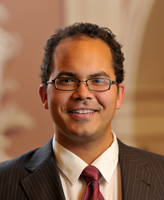Three Ph.D. candidates in the University of Notre Dame’s Department of Theology have recently been awarded prestigious fellowships from organizations such as the American Academy in Rome, Harvard University’s Dumbarton Oaks Research Library and Collection, the Dolores Zorhab Liebmann Foundation, and the Louisville Institute.
“Theology’s doctoral students have long been very competitive in winning prestigious doctoral and postdoctoral fellowships, as well as in gaining positions in elite universities such as Harvard or Oxford,” says Department of Theology Chair J. Matthew Ashley.
“We are very proud of these most recent exemplars of that trend, who provide eloquent testimony not only to the strength of those students we accept but also to the quality of the teachers and mentors who take them to the next level of scholarly excellence.”
Rediscovering a Voice

Albertus Horsting recently left for Italy on a Rome Prize fellowship from the American Academy in Rome. Out of more than 1,000 applicants each year, the academy selects just 30 “emerging artists and scholars in the early or middle stages of their careers who represent the highest standard of excellence in the arts and humanities.”
Horsting, who declined a Fulbright grant to Austria in order to accept the Rome Prize, says the honors were a welcome validation of his research, which sits on the threshold between classics and theology. “It’s not a typical project for a theologian,” he says. “It’s highly philological, highly textual work, so I was pleased to see that they wanted to support that kind of project.”
While in Rome, he will examine dozens of manuscripts in the Vatican Library and travel to other libraries across Italy, France, and Switzerland in an attempt to reconstruct the original version of a 5th century book of poems by Prosper of Aquitane, who was known as St. Augustine’s greatest promoter and defender.
The Liber Epigrammatum, a poetical synthesis of Augustine’s theology, was “one of the most widely read books during the Middle Ages” but is now largely forgotten, Horsting says. “I am preparing the first modern edition of the work, along with an English translation and commentary to elucidate its meaning. The end result is that this text—which has been obscured by time—is once again accessible and Prosper’s voice can be heard.”
Originally published by at al.nd.edu on September 16, 2011.